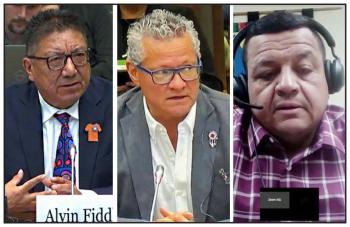Image Caption
Summary
Local Journalism Initiative Reporter
Windspeaker.com
First Nations chiefs and administrators from Ontario west to Alberta told the Standing Committee on Indigenous and Northern Affairs to scrap proposed legislation that would recognize Métis governments in three provinces.
The previous week, the standing committee had heard from leaders of the Métis Nations of Alberta, Saskatchewan and Ontario who asserted that Bill C-53, an act that would recognize their governments, dealt only with internal governance and did not relate to land or resources.
“You cannot have self-government without the land,” Chief Greg Desjarlais of Frog Lake First Nation in Treaty 6 territory in Alberta told the standing committee on Tuesday.
“The title of the Bill says it’s to give effect to treaties with those governments,” said Jason Batise, executive director of Wabun Tribal Council. He spoke to the committee on Thursday, the second day this week it heard from those opposed to the Bill C-53.
Along with recognizing the Métis governments, the act is also to “give effect to treaties with those governments and make consequential amendments to other Acts.”
“Aboriginal rights do not exist in the abstract. They are tied to the land,” said Batise.
The land on which the Métis Nation of Ontario (MNO) claims to have historic communities would be the “width and breadth” of Ontario, he said.
“If (Canada) signs a treaty with them, it overlaps all of our treaties in Ontario. It will become the biggest treaty in Ontario and that’s not right,” said Grand Chief Francis Kavanaugh of Grand Council Treaty No. 3.
At issue are six additional historic Métis communities that the MNO and the province of Ontario have identified as being part of the historic Métis homeland.
For Matawa First Nations, which comprises nine nations and a population of 10,864, that would have a substantial impact on traditional territories and homelands which are known as the Ring of Fire region, said David Paul Achneepineskum, CEO for Matawa.
Minerals in that area, he said, are setting Canada up as a rich repository for the new green economy.
“The Métis Nation of Ontario publicly makes unsubstantiated claims, including James Bay Treaty #9 boundaries and the richest traditional territories of the Matawa First Nations,” said Achneepineskum.
“Self-government leads to a lot of things…It’s going to lead to lands and resources…As far as we are concerned, we are the rightful land holders in our treaty territory and we want to keep it that way,” he added.
Nipissing First Nation Chief Scott McLeod said that until Canada did its “due diligence” to determine which communities being claimed by MNO were truly historical, the MNO could not be recognized as being Sect. 35 rights holders in Bill C-53 under Canada’s Constitution.
The standing committee was told that two recent reports by the Wabun Tribal Council and the Robinson-Huron Waawiindamaagewin showed that the MNO were claiming Anishinaabe ancestors as Métis ancestors and, in so doing, were saying these new historical Métis communities existed.
Chiefs said that their Elders had never known historic Métis communities in their traditional territories.
“(Canada’s) whole approach has been recognize first and verify later,” said McLeod.
Batise said that Wabun Tribal Council attempted to use the Freedom of Information Act to get the background research Canada relied on to justify the recognition of the Abitibi Inland Historic Métis Community as rights holders in Treaty 9 territory. However, the attempt was unsuccessful because Canada protected the information as Cabinet privilege.
McLeod said that Métis communities were already pushing for involvement in and benefits from development in First Nations traditional territory.
“We already know the impacts of what is happening on the ground in our territories with regards to this illegitimate recognition. So the fact that the entire legislation recognizes them to be able to govern in our territories is problematic,” said McLeod.
Ontario Regional Chief Glen Hare said that Ontario First Nations supported legitimate rights holders, but the groups represented by the MNO were not legitimate.
“Canada’s current attempt to force through Bill C-53 will do nothing but damage First Nations’ rights for generations to come and I am here to tell you that it is likely to cause damage to our relationship with you,” said Nishnawbe Aski Nation Grand Chief Alvin Fiddler.
Chiefs also expressed dismay that Canada would rush into self-government agreements with the Métis Nations when there was so much left unfulfilled for First Nations.
“Bill C-53 will impede the ability of First Nations to have their treaty obligations fulfilled. Even before treaties are made with the Métis, they are standing in the way of First Nations’ treaty fulfillment,” said Grand Chief Cathy Merrick of the Assembly of Manitoba Chiefs.
“The honour of the Crown is not upheld when Canada creates legislation that disregards our treaties,” said Desjarlais.
Every First Nation representative made it clear that they had not been consulted during Bill C-53’s development and they should have been.
Merrick, who attended virtually, could not respond to questions from the standing committee because of technical difficulties. She was asked to respond in writing.
On Nov. 7, the standing committee will hear from the Manitoba Métis Federation and once more from representatives from the Métis Nations of Alberta and Saskatchewan. Also speaking will be Jason Madden, regular legal counsel for the Métis Nations, and Ken Coates, chair for the Indigenous Governance Program at Yukon University.
Windspeaker is owned and operated by the Aboriginal Multi-Media Society of Alberta, an independent, not-for-profit communications organization.
Each year, Windspeaker.com publishes hundreds of free articles focused on Indigenous peoples, their issues and concerns, and the work they are undertaking to build a better future.
If you support objective, mature and balanced coverage of news relevant to Indigenous peoples, please consider supporting our work. Whatever the amount, it helps keep us going.

